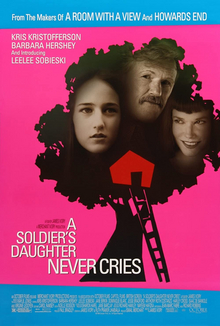Plot
Bill Willis, a successful American novelist and World War II veteran, is living in Paris in the 1960s with his family. He is much loved by his free-spirited, unpredictable wife Marcella. The couple, popular on the Paris cocktail-party circuit, has a six-year-old daughter, Channe (short for Charlotte Anne). Marcella yearns to have another child, but a series of miscarriages has made that difficult. However, the family circle expands when a six-year old French boy, Benoit, is brought to their home for adoption. The child's biological mother, a beautiful young unmarried girl, has been unable to care for him, and he has been shipped through so many orphanages and foster homes that at first he hesitates to unpack his suitcase. Having feared rejection, the little boy is surprised by the love he receives in his new surroundings. After Benoit becomes acclimated to his new family, he asks that his name be changed to Billy after his adoptive father.
Billy's presence prompts young Channe to turn to her protective Portuguese nanny Candida. Initially jealous of her new brother, Channe quickly warms to him, inviting him to share her bed after he wets his. Marcella physically confronts a stern teacher for the punitive measures she has taken against her son. Channe notices the culture clash at her bilingual school, the flirtatious circle of friends around her parents, the vulgarity of American children who visit, and an encounter with a French boy who tries to seduce Channe with the help of large snails; he insists that she take off her shirt and let them crawl on her skin.
When Billy and Channe become teenagers, a strong friendship develops between Channe and Francis Fortescue, a flamboyantly effeminate youth with a passion for opera. The fatherless Francis lives with his eccentric expatriate British mother. He helps Channe test her wings as a nonconformist. Fear of love makes Candida rejects a proposal of marriage from her long-suffering African boyfriend Mamadou. As Channe begins to be interested in other boys, she distances herself from Francis, who confesses to her that he had a little crush on her. The family's French idyll is disrupted when Bill Willis plans a return to the United States because he wants American doctors to treat his heart condition
The family moves to New England during the 1970s. Their future is threatened by Bill's declining health, Marcella's alcoholism, and the struggles of Channe and Billy to adapt to American high school. Billy, awkward and reserved, is bullied at school. Channe drifts from boy to boy, giving sex in exchange for acceptance until she falls for Keith, a fellow student who becomes her steady boyfriend. Immersed in the writing of a new novel, Bill is worried about the future of his family when he would be gone. The irregularity of Billy's adoption comes to haunt him. The boy's biological mother had him at fifteen from a relationship with a cousin and wrote a diary while pregnant. Bill has kept the diary all these years in anticipation of the day when his adopted son would want to know the truth about his origins. Channe's relationship with Keith fades away as she helps her sick father write his novel. Bill's death affects his wife and children deeply. Billy comes out of his reserve to take care of the house and helps his grief-stricken mother. Marcella, as her husband had wanted, gives Billy the diary to read, but he is uninterested. One evening, Channe, Marcella, and Billy put on a record and begin to dance. Billy takes a quick peek at the diary.
Cinematography
Filming took eleven weeks in all, of which four were in France and seven in America. Ivory wanted to use a French director to film the section set in America: "The family feels displaced in their new, less glamorous suburban surroundings, and Ivory wanted the audience to see this world through the eyes of someone who was "fresh and not jaded by having lived there and seen it a million times."" [1] Fabre has spoken about the simple, almost all one-camera, approach he took to the film., and the decision to film faster and less deliberately than some other Merchant Ivory films. There were difficulties with the location in Paris, "solved to some degree -- especially during nighttime party scenes often filmed during the day -- by simply avoiding the windows, a strategy which lends a close intimate feel that happens to be entirely appropriate to the story". [1]
Reception
The film garnered a favorable critical reaction, holding a fresh rating of 80% on Rotten Tomatoes based on 25 reviews. [5] Metacritic gave the film an average score of 66/100, indicating "generally favorable" reviews. [6]
Roger Ebert of the Chicago Sun-Times rated the film three and half stars out of a possible four, commenting: "The film's appeal is in the details. It re-creates a childhood of wonderfully strange friends, eccentric visitors, a Paris that was more home for the children than for the parents and a homecoming that was fraught for them all". [7]
Online film critic James Berardinelli gave the film a favorable review: "Not only was I touched by the characters and engrossed by their story during the 120 minutes they were on screen, but I could have easily spent another hour or two with them". [8]
In the words of Jonathan Rosenbaum, writing for the Chicago Reader : "The three parts add up to a rather lumpy narrative, and the characters are perceived through a kind of affectionate recollection that tends to idealize them, but they're so beautifully realized that they linger like cherished friends". [9]
This page is based on this
Wikipedia article Text is available under the
CC BY-SA 4.0 license; additional terms may apply.
Images, videos and audio are available under their respective licenses.
